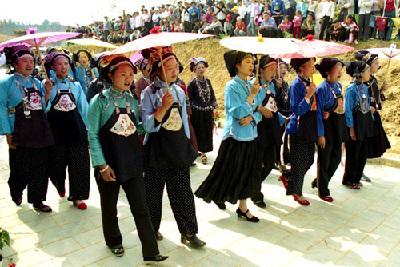Traditional festivals for the Zhuang ethnic group
The Zhuang ethnic group celebrates festivals the whole year around, some of which center on new year resolutions, some on cultivation and the harvest, others on commemoration of ancestors. They all reflect people’s love of life and their desire for a better future. Some of them also mirror the solidarity as well as the virtues of the group, members of which help others and care for their families. The sacrifice activities on the other hand indicate sincere wishes to be protected by the Chinese gods (Jin, Mu, Shui, Huo, Tu, which represent respectively gold, wood, water, fire and earth.).
January
Spring Festival
The most important festival of the year in China is the Spring Festival, which is also grandly celebrated by the Zhuang minority. After a rich dinner the day before the Spring Festival, people gather around the fireplace to stay up late to greet the New Year. The deafening sounds of fireworks going off continue throughout the night. As the New Year comes, people light up candles and burn incense to pay respects to their ancestors and household gods for the fortunes of future generations. Pork, chicken, glutinous rice and rice wine are displayed as sacrifices.
|
 The Zhuang ethnic group is an enthusiastic community in which singing and dancing are basic to their entertainment. |
On the day of Spring Festival, most people of the Zhuang minority usually stay at home. Tangyuan (glutinous rice balls) is the main dish during the day, while meat is only for dinner. According to the Zhuang minority, this can keep diseases and misfortune at bay. In addition, a series of traditional rules must be observed on this day. People are not allowed to use scissors in order to prevent family quarrels; cleaning is prohibited so as to avoid property loss; lending is forbidden so as to keep family wealth; animal killing is also forbidden.
On the second day of Spring Festival, people start to pay visits to their friends and relatives. Gifts in hand, a married daughter should return to her parents’ house with her husband and children. On this occasion, sisters that haven’t seen each other for a long time gather together to share their life experiences.
Traditionally, the Zhuang minority celebrates the entire first month of the lunar New Year. Throughout the month, people dance to the beat of drums, perform lion dances, sing songs and watch folk plays.
February
1. Sacrifice to the Land God
The festival falls on the 2nd day of the 2nd lunar month, which conveys a sense of praying for a productive new year. Throughout its long agricultural history, the Zhuang minority has been subsisting on land, resulting in a popular worship of the Land God. Land temples have been established in all the villages in order to offer sacrifices to the Land God. Perceived as a regional patron, the Land God can guarantee a good harvest of agricultural products and protect the villages from the attacks of wild beasts. On the day of the festival, households offer chicken and pork meat as sacrifices to the Land God, hoping to embrace a fertile, energetic and peaceful life.
2. The day of the Flower Goddess
The festival falls on the 2nd or the 19th day of the 2nd lunar month, and is a tradition of the Zhuang minority in Ningming, Longzhou, Guangxi Province.
|
 |
According to legend, the Flower Goddess entered the earth on this day and rested on the strong, flame-red kapok tree, protecting a blossoming and tranquil world. It is said that the Goddess cares for human fertility and children’s safety. Therefore, a newborn of a Zhuang minority family will be accompanied by a Goddess tablet decorated with wild flowers. On the 1st or 15th day of each lunar month, incenses are burned to worship the Goddess. On the 29th day of the 2nd lunar month, a grand sacrifice will take place where married women are tied to their sisters and pray for fertility and healthy babies.
The festival is celebrated in a place with high kapok trees, attracting young men and women from across the region. Wearing splendid national attire, they bring food and gifts and sing love songs to their beloved. As the festival reaches its climax, numerous embroidered balls with red ribbons will fly like Cupid’s arrow to their lovers, creating a spectacular rainbow-effect in the sky.


















